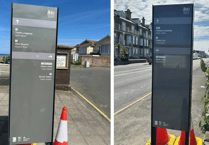TWO Gwynedd authors, who have spent years collating snippets of information and anecdotes, have published a book chronicling the often brutal conflict between smugglers and Excise men along the shores of Wales.
Smuggling in Wales, as in many other countries, was driven by hardship and poverty. Coastal communities often suffered such hard times and Wales in particularly, was a smuggling haven with its rugged western shores and remote coves and caves, conveniently situated in the Celtic sea within reach of the contraband centres of the Isle of Man, Ireland, France and Brittany.
Smugglers of Wales, by Twm Elias and Dafydd Meirion chronicles the often brutal conflict between smugglers and the Excise men and also discloses that some quite respectable gentlemen – lords of the manor and churchmen – were often behind the scene links between the boatmen and the city markets for contraband. It takes us from cove to cove along the shore of Wales, exploring the stories about places which have not been previously published.
With a coastline making up some three-quarters of its border, around 600 miles in total, it’s not surprising that there are so many stories about smuggling in Wales.
Surprisingly though, smuggling has received very little attention from Welsh historians.
Tales of tunnels and smugglers coves are rife in all coastal areas of Wales, such as the urban myth that a tunnel runs from Y Gegin Fawr in Aberdaron to the beach and another from the building on the opposite corner (which is now a café and shop) and passes under the cemetery to the beach,
Again in Llyn, a tunnel is supposed to lead from the beach under Tyddyn Isaf farm, near Tudweiliog, which explains why the sound of waves are sometimes audible in the farmhouse.
See this week’s north editions for the full feature, in shops and online now




.jpeg?width=209&height=140&crop=209:145,smart&quality=75)
This article has no comments yet. Be the first to leave a comment.